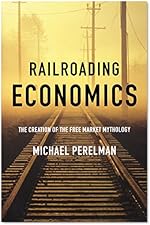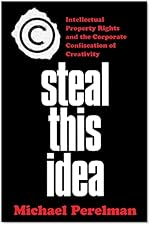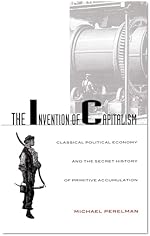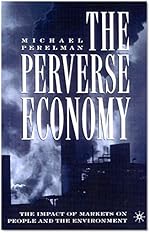Archive for December, 2007|Monthly archive page
Away with Sarbanes Oxley?
Whatever happened to the rabid calls for eliminating Sarbanes Oxley? Does anybody even Enron, Tyco, Worldcom, etc? After calls for strong regulation to prevent such things from happening again, Congress gave us the weak Sarbanes Oxley. Not long after, the business press was squealing about the excessive requirements of Sarbanes Oxley.
Now that the subprime mortgage scam is imploding, Sarbanes Oxley has fallen from notice.
Any thoughts?
Andrew Carnegie
I have just finished an interesting new book: Nasaw, David. 2007. Andrew Carnegie (New York: Penguin), which caused me a bit of embarrassment.
In Railroading Economics, I emphasized Andrew Carnegie’s role in paying careful attention to the production process of steel in contrast to they banker-like perspective of the Morgan crew, which took over Carnegie Steel. This Nasaw’s story is not entirely different, but the emphasis certainly is. Nasaw totally explains that Carnegie ignored any concern with the minutia of the production process, but merely demanded reductions in cost.
The most important cost for Carnegie was labor. He plowed back about 75% of the company’s earnings into reinvestment, often in labor saving technologies. But even more important was the crushing of labor, especially the Homestead strike, which allowed him to increase the working day to 12 hours. This victory probably also greased the skids for the acceptance of new technology.
The book is a magnificent production. Nasaw had access to material that nobody else did.
Nasaw shows how important influence was in accumulating for Carnegie fortune. Carnegie reminds me of Balzac, who wrote:
“At the bottom of every great fortune… , there’s always some crime — a crime overlooked because it’s been carried out respectably.”
In the case of Carnegie, no great crime seems to have been responsible. Instead, Carnegie left a trail of innumerable crimes. Homestead was the most notable, but it had a number of less bloody precedents in his own company. In his earlier career as a bond salesman, Carnegie engaged in an almost habitual dishonesty along with continual shady dealings, such as kickbacks.
Carnegie was a master of accumulating political influence in the US and in Britain.
The most fascinating part of the book was Carnegie’s philosophy. An early age, he anticipated the basic idea of Herbert Spencer, who later became his idol. He decided he would accumulate great wealth, then rather than hoarding it, he would distribute it for noble causes.
Smashing the workers at Homestead was a moral act for him. The workers would not know what to do with any extra money they earned. He wrote:
“… there are higher uses for surplus wealth than adding petty sums to the earnings of the masses. Trifling sums given to each every week or month — and the sums would be trifling indeed — would be frittered away, nine times out of 10, in things which pertain to the body and not to the spirit; upon richer food and drink, better clothing, more extravagant living, which are beneficial neither too rich or poor.”
Libraries, museums, and concert halls would contribute more to human welfare, especially for people working 12 hours a day.
Could the Spread of Tropical Diseases Make Global Warming Have More Urgency?
Upton Sinclair’s Jungle was intended to draw attention to the dirty and repressive conditions in the meat packing industry.
Reflecting on the storm over The Jungle, Upton Sinclair wrote that he was primarily moved by the condition of the workers, not the meat: “I aimed at the public’s heart, and by accident I hit it in the stomach.”
Upton Sinclair. 1952. American Outpost: A Book of Reminiscences (NY): p. 175.
Similarly, chikungunya, a relative of dengue fever normally found in the Indian Ocean region, has migrated to Italy. Continue reading
More Housing Woes Ahead? Part 2
In a recent Ohio case. the judge dismissed a number of foreclosure requests because the plaintiffs could not show that they were the legal owners of the properties. This ruling seemed like it was a minor technicality is going to the complicated nature of the securitized mortgages. BusinessWeek published a short article, saying that the ruling was more serious. Although the creditors can rectify the situation, to do so will not be an expensive. Perhaps more interestingly, the article suggests that the failure to do the proper paperwork may open up some parties is to legal liabilities.
More Housing Woes Ahead? Part 1
The Wall Street Journal reports on the spread of homes with negative equity. As of a year ago, estimates were that for 7% of mortgages that originated in 2004 through 2006 the amount owed was more than their homes were worth, but housing prices have fallen nearly 5% since then and are predicted to fall further. Continue reading
The WTO, Gambling, and Intellectual Property
The United States Puritanical values collided with its neoliberal ideology in passing a law that prevented online gambling. Several companies — Microsoft, Google, Yahoo — just paid fined for posting ads for Internet gambling. Antigua and Barbuda protested since the US allows other forms of domestic gambling. They demanded huge compensation for their loss of business. The WTO judgment offers a much smaller amount, but it gives the country the right to violate intellectual property up to $21 million. Continue reading
The Payoff From Being Too Big to Fail?
The Wall Street Journal had an interesting piece suggesting that banks pay a premium for takeovers that bring their size up $100 billion. Maybe if the writeoffs get a bit bigger, Too Big To Fail status may pay off. Continue reading
History Note: Chico Plane Hijacked to Arkansas
My home, Chico, California, is not often seen as the center of the world, but we do have some distinctions. For example, the first airline hijacking on US soil occurred here. It may also be the only time that anyone ever hijacked a plane to Arkansas.
http://blogs.ocweekly.com/navelgazing/main/another-california-first-hijac/
Radio Interview Today
I was interviewed today on KPFK Los Angles on Ian Masters’ Background Briefing for the last 20 minutes of his show. I did not get to discuss the Confiscation of American Prosperity very much because the publisher neglected to send him a copy.
http://64.27.15.184/parchive/mp3/kpfk_071216_110100bbriefing.mp3
Sorry
I am deep into finals without any time to blog. I hope to get back to you in a couple of days.
 Leave a comment
Leave a comment
 25 – The Confiscation of American Prosperity: From Right-Wing Extremism and Economic Ideology to the Next Great Depression
25 – The Confiscation of American Prosperity: From Right-Wing Extremism and Economic Ideology to the Next Great Depression 30 – Manufacturing Discontent: The Trap of Individualism in Corporate Society
30 – Manufacturing Discontent: The Trap of Individualism in Corporate Society Class Warfare in the Information Age
Class Warfare in the Information Age Railroading Economics: The Creation of the Free Market Mythology
Railroading Economics: The Creation of the Free Market Mythology Steal This Idea: Intellectual Property Rights and the Corporate Confiscation of Creativity
Steal This Idea: Intellectual Property Rights and the Corporate Confiscation of Creativity The Invention of Capitalism: Classical Political Economy and the Secret History of Primitive Accumulation
The Invention of Capitalism: Classical Political Economy and the Secret History of Primitive Accumulation The Perverse Economy: The Impact of Markets on People and the Environment
The Perverse Economy: The Impact of Markets on People and the Environment